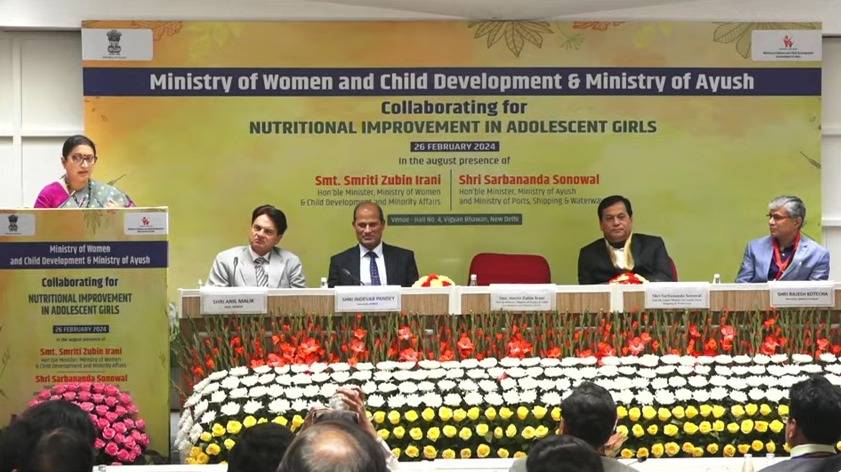
The Ministry of Women and Child Development and the Ministry of Ayush have made a major advancement in the nutrition and health of adolescent girls on February 26 2024 at Vigyan Bhavan in New Delhi. A Memorandum of Understanding (MoU) has been signed for a Joint Public Health Initiative with the goal of "Anaemia Control among Adolescent Girls using Ayurveda interventions in the five districts under Mission Utkarsh." The ceremony witnessed the presence of distinguished personalities including Union Minister of Ayush, Sarbananda Sonowal, and Union Minister of Women and Child Development, Smriti Irani.
Focus Areas and Objectives
In the initial phase, the focus will be on addressing the anaemic status of adolescent girls aged 14 to 18 in five aspirational districts across Assam, Chhattisgarh, Jharkhand, Maharashtra, and Rajasthan. These districts, namely Dhubri, Bastar, Paschimi Singhbhum, Gadchiroli, and Dhaulpur, exhibit a high prevalence of anaemia, averaging approximately 69.5%.
The overarching goal of this collaboration is to enhance the nutritional status of around 95,000 adolescent girls residing in these anaemia-prone districts. The project will encompass approximately 10,000 Anganwadi Centres within the identified districts.
Towards an Anaemia-Free India
In his address, Union Minister Sarbananda Sonowal emphasized the joint commitment of both ministries towards achieving an 'Anaemia Mukt Bharat' (Anaemia Free India). He highlighted the significance of the Mission Utkarsh, a national endeavor aimed at elevating key performance indicators (KPIs) in aspirational districts, as launched by the Prime Minister of India.
Minister Smriti Irani underscored the importance of introducing Ayush systems, supported by evidence from esteemed institutions like the Indian Council of Medical Research (ICMR). She noted that such interventions offer cost-effective solutions for combating anaemia, presenting a novel approach to a global health challenge. The initiative not only promises cost efficiency but also provides an opportunity for medical communities worldwide to study and learn from its outcomes.
Vaidya Rajesh Kotecha, Secretary of the Ministry of Ayush, shed light on the adverse effects of anaemia during adolescence, including reduced physical and mental capacity, as well as diminished educational performance. He stressed the integral role of traditional medicine systems in primary healthcare settings, advocating for their incorporation into holistic health interventions.
Holistic Approach to Nutrition and Health
Secretary of the Ministry of Women and Child Development, Indewar Pandey, reiterated the ministry's commitment to addressing malnutrition among children, adolescent girls, and pregnant women. He highlighted ongoing schemes such as "Saksham Aanganbaadi" and "Poshan", which aim to provide comprehensive support across 13.97 lakh Aanganbaadis nationwide. Focusing on adolescent girls between 14 to 18 years is deemed crucial, as it contributes to ensuring future maternal and child health.
The Central Council for Research in Ayurvedic Sciences (CCRAS) brings significant expertise to this collaborative effort. With successful implementation of initiatives like the National campaign on Anaemia control through Ayurveda and operational studies in districts like Gadchiroli, CCRAS has demonstrated its capacity to address public health challenges effectively.
The MoU signing ceremony witnessed the participation of key stakeholders, including Prof. Ravi Narayan Acharya, Director General of CCRAS, Pushpa Chaudhary from the World Health Organization (WHO), and Dr. Rajeev Bahl, Director General of ICMR.










